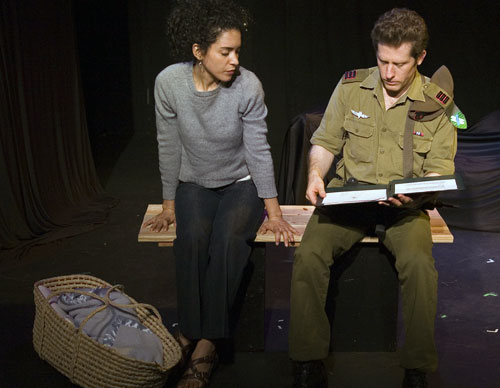
The afternoon exploded in combat. It was October 6, 1973, the most solemn and significant day on the Jewish calendar, Yom Kippur—the Day of Atonement. Egyptian armies had crossed into Israel from the Sinai and Syrian forces from the Golan Heights, areas both captured by the Israelis five years earlier in the Six-Day War.
“What could this be?” wondered Meri Wallace, an expatriate from Brooklyn living in Jerusalem at the time. “All the sirens were going off,” Ms. Wallace said. “I thought, ‘how clever, an air raid drill on Yom Kippur.’ But it wasn’t a drill.” The Brooklyn native, who said she always felt a strong connection to her Jewish identity growing up in Sheepshead Bay, had moved to the fledgling nation with a handful of fellow expats dedicated to “fighting for Israel.”
For eight years she lived in the war-ravaged country, and that experience provided the inspiration for her new play, “Yom Kippur,” which is being presented in a staged reading by the Naked Stage theater group on Tuesday, October 7, at 7:30 p.m. at Guild Hall in East Hampton. Ms. Wallace’s play debuted last summer at the Workshop Theatre in Manhattan as part of the Ninth Annual Midtown International Theatre Festival.
“Yom Kippur” revolves around two married American couples, Yitz and Yael and Ephraim and Sarah, all of whom who have emigrated to Israel, a process known as Aliyah. Yael is pregnant with Yitz’s child when he enlists in the Israeli Defense Forces. Ephraim, though married to Sarah, secretly yearns for Yael. While Ephraim stays behind and Yitz marches off to fight, the lives of the couples unravel beneath the shadow of war and personal conflict.
In the midst of these struggles, Ms. Wallace uses the stage as a testing ground for patriotism, faith, and sense of purpose. “I wanted to write this play to show the love that American Jews have for Israel,” Ms. Wallace said. “It’s a dilemma for many who want to live there because it’s scary and dangerous. It’s a very hard life.”
The playwright said living in Israel was “wonderful, but sad,” similar, she said, to being in New York after 9/11. “After the trucks came and took away the men to go fight, we listened to Golda Meir on the radio. Her speech was beautiful and strong,” Ms. Wallace said. “She said we would prevail. She was like Giuliani after the towers fell.”
Though Ms. Wallace described the Israelis as a strong and resilient people, life in Israel, she said, especially at that time, was full of anxiety. “If you found a pen on a bus you had to say something, because often times they were actually bombs. Unlike here in America, in Israel, you’re surrounded by enemies.”
Ms. Wallace, who now lives in Amagansett, said her play is somewhat autobiographical, but mainly focuses on allegiance to one’s country and identity. “My husband went off to fight while I was pregnant,” Ms. Wallace said. “I was in a ward with other women whose husbands were gone as well. I didn’t see him for weeks. I didn’t know whether he was alive or dead.”
Ms. Wallace moved to Israel when she was 20 after being part of Hashomer Hatzair, a Zionist youth movement, and trained to work in a kibbutz, a traditional community based on farming. “I was always fascinated by and drawn to this handful of people who miraculously defeated these surrounding armies and turned the desert fertile,” Ms. Wallace said.
“Israel is such a gorgeous land, with green valleys and snow covered mountains and incredibly rich in heritage. And in Jerusalem you have the center of the world’s three great cultures and religions.”
Though she hasn’t been back to the country that inspired her play, Ms. Wallace said “Yom Kippur” has re-ignited her passion to return to her former adopted homeland. “I’ve had a spectacular experience with this play, I’d like to see it performed in Israel,” she said,
In the meantime, what’s brought to life on stage through the characters she created allows Ms. Wallace to reconnect with a special time in her life that she described as a glorious. “In Israel,” she said, “I felt free to be a Jew.”